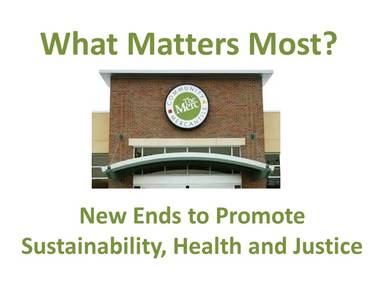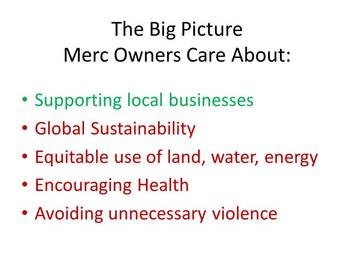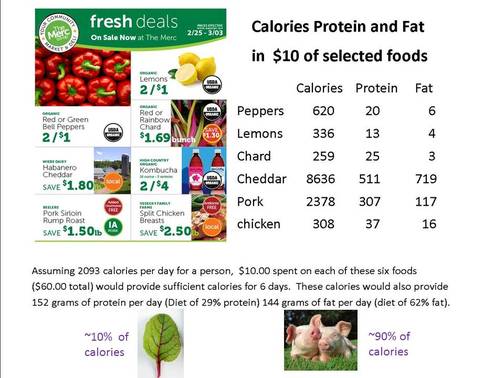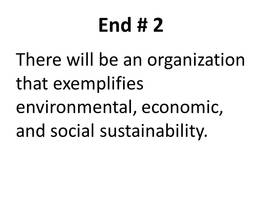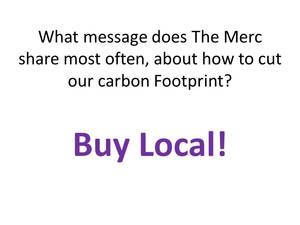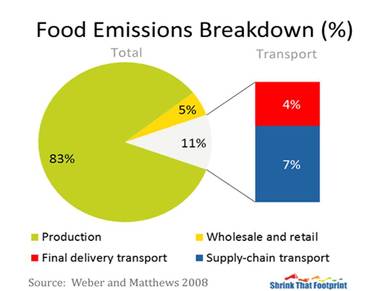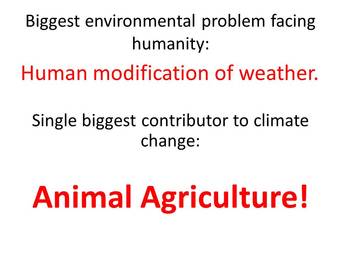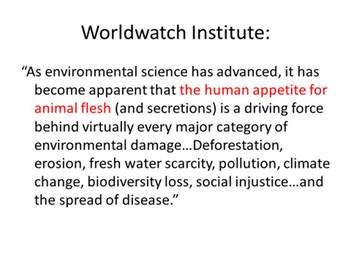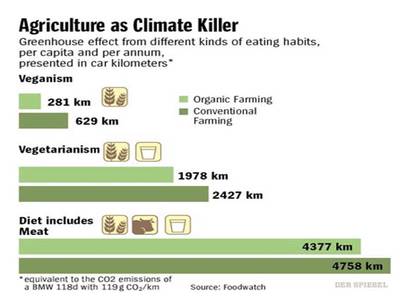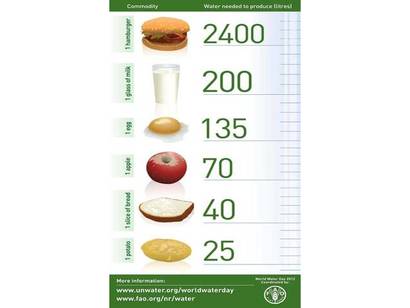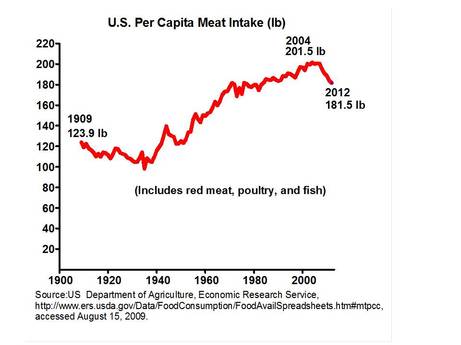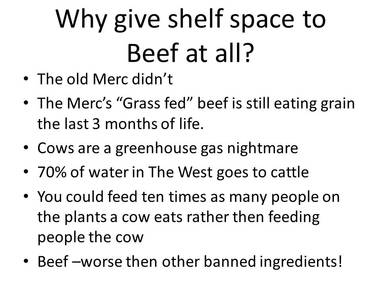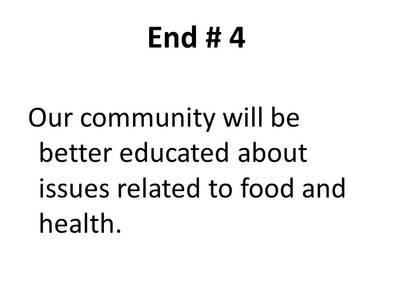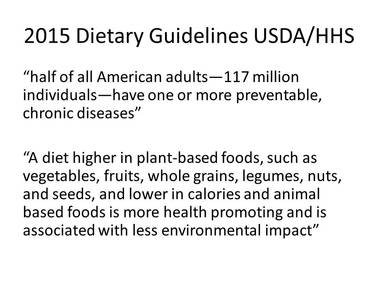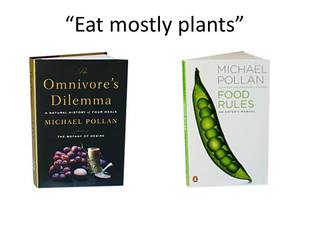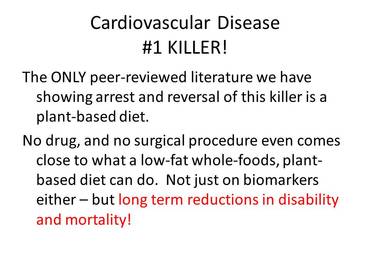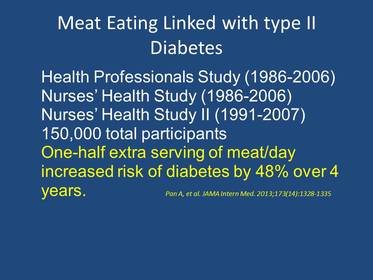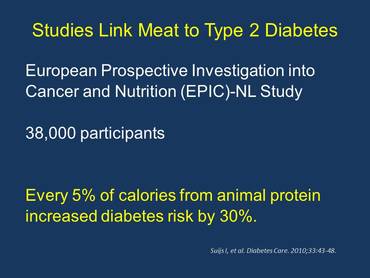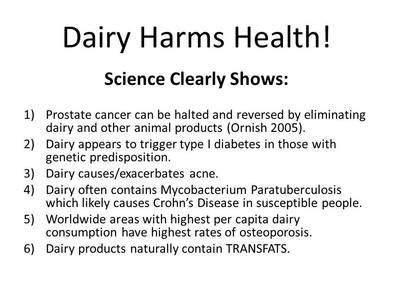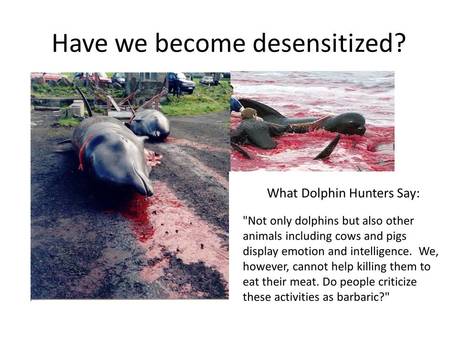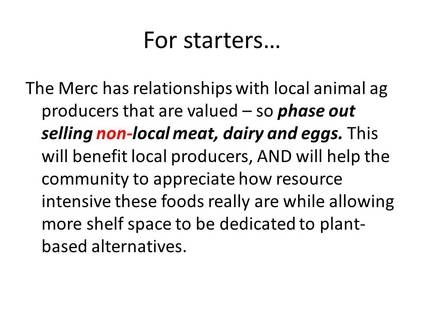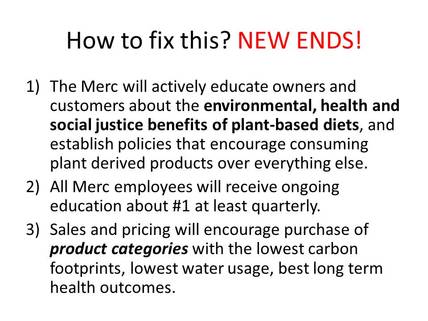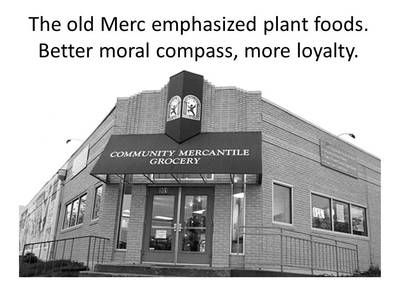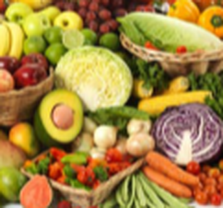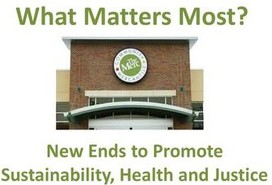
The Lawrence Community Mercantile encourages owner/members to attend the monthly board meetings, and on March 2, 2015 I went and requested ten minutes to share the slides below with the board. The red text below each slide is the narrative I read with each. Following my presentation, the board tried to put an end to my teaching cooking classes there...and I still don't understand why THAT presentation made them want to get rid of me. I do not know if the board was unanimous in this, or if some members might have spoken up on my behalf, but were overruled by the majority. I am posting my presentation here, because I want Merc members and the citizens of Lawrence to judge for themselves. Do YOU think my making the case below to the board, justified them trying to get me kicked out of teaching classes there, or do you think I was just acting in good faith on my conscience and attempting to exercise my rights as a member/owner, and they were the ones who were out of line? You can read the whole story of them attempting to censor me Here.
1. You may remember me from when I almost ran for the board last election. As I result I probably appreciate more then most people just how much work you all do to support the Merc. I just want to express my appreciation for that, as well as the opportunity to share my thoughts with you today. I saw in last month’s minutes that you may be updating the ends and that is what I’d primarily like to address.
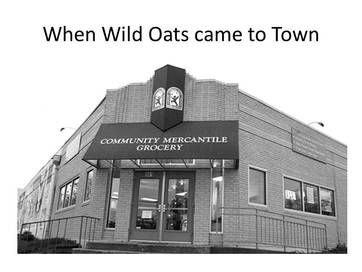
2. Remember when The Merc was in this building? Two things stood out in my memory from that time. 1) Wild Oats came to town and undercut our prices – but customer loyalty was so strong Wild Oats closed their doors and left town. 2) Very little shelf space was dedicated to meat, dairy and eggs.
3. Here are five things that our main shoppers probably all care about. We do a great job with the first, but could do much better with the other four. We give lip service to these and make a big deal about minor factors while ignoring the much more important ones.
4. Here is the latest ad. I asked this question, “What if someone spent their food dollars according to what marketing encouraged? I realize most people don’t do this, but the point I want to make is this: The more closely shoppers’ economics reflect what marketing encourages the more closely we approach 90% of calories from animal foods.
5. So what is our main message to people about how their food choices can help the environment?
6. Isn’t this pretty much the only message the community hears from the Merc?.
7. Why are we emphasizing food miles when they are less then 10% of the carbon footprint, while ignoring the 80% piece?
8. The biggest problem we face is human modification of weather and the biggest contributor is animal agriculture.
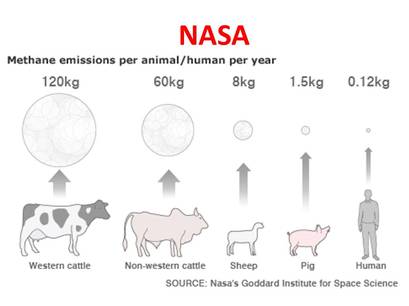
11. This really puts it into perspective. We talk about food miles and organic, while encouraging meat and dairy which are the problem.
.
14. But why give shelf space to beef at all?
16 The US Dietary Guidelines just came out. Here are two lines from the executive summary.
17. Even Pollen, who has spent his career trying to justify his desire to eat meat says “Eat mostly plants”. And why is that?
18 Look around the room. According to statistics, half of us will die prematurely from heart disease – which is almost entirely preventable.
19. We also know meat eating is linked with Diabetes. These studies suggest…
20. And this study found that for every 5%....EPIC with 38,000 Dutch participants, NHANES study of over 6,000 participants followed for over 20 years showed a high protein intake (which was 20% cal from protein). There was no association for vegetable protein.
21. It’s not just meat. The science clearly shows dairy is harmful too.
22. Most of us claim to oppose unnecessary violence to animals. It’s much easier for us to see the normalized violence in other cultures while ignoring our own – especially it is connected with something that brings us pleasure.
23. I realize the Merc has important relationships with local meat, dairy and egg producers, so let’s begin phasing out non-local.
24. Utimately we cannot compete with Sprouts and Natural Grocers on their terms (price). We must define what matters and educate the community.
25. The old Merc emphasized plant food, had a better moral compass and more loyalty.
Be sure to read the rest of the story about how The Merc has attempted to censor my free speech HERE.
Just so you know -- my intent here is to start a community wide conversation: Do the people of Lawrence (and Merc member/owners) think it is in everyone's best interest to allow small groups in leadership positions, based upon their personal bias, to exclude thoughtful perspectives they don't like, from participating in the venues they control -- often without the public even knowing the censorship has occurred, or do you want to create a cultural imperative that opposes such censorship as undemocratic? Do you value free speech?
More has happened since this powerpoint was posted. You can read about it here: The Merc Makes Another Move -- JoAnn Farb responds
Feb 26, 2016 update to this post: When I was creating this power point, in preparation to give it to The Merc's board, I went to their meat department at that time and looked to see what beef they were selling. I recall they had some from a farm that I think was in Arkansas, and when I called that farm, they told me that ALL of their beef was "finished" for three months on grain (making it NOT truly "grass' fed) I then brought this up with a woman who worked in the Merc's meat department and asked if they had any truly grass fed beef and she apologetically told me that they did not, and I included that fact in my power point. A few days ago, The Merc just advertised that they have grass fed beef for sale and when I went to the website of this newer vendor, I saw that they state that their cows are 100% grass fed. People should be aware that with regards to climate change, this is actually worse. Cows fed grain grow more quickly then grass-fed (even though they feel miserable eating grain and are more likely to be sick and their flesh contaminated with more pathogenic strains of bacteria) and the more quickly they reach slaughter size, THE LESS methane and CO2 is emitted per pound of beef. Also -- any farms feeding their cows alfalfa in the winter (and I don't know if they do or not) that has been grown in California is very unsustainable. Alfalfa is one of the most water intensive crops grown in that state, and a big contributor to their water crisis.
The only good alternative is to go vegan.
Just so you know -- my intent here is to start a community wide conversation: Do the people of Lawrence (and Merc member/owners) think it is in everyone's best interest to allow small groups in leadership positions, based upon their personal bias, to exclude thoughtful perspectives they don't like, from participating in the venues they control -- often without the public even knowing the censorship has occurred, or do you want to create a cultural imperative that opposes such censorship as undemocratic? Do you value free speech?
More has happened since this powerpoint was posted. You can read about it here: The Merc Makes Another Move -- JoAnn Farb responds
Feb 26, 2016 update to this post: When I was creating this power point, in preparation to give it to The Merc's board, I went to their meat department at that time and looked to see what beef they were selling. I recall they had some from a farm that I think was in Arkansas, and when I called that farm, they told me that ALL of their beef was "finished" for three months on grain (making it NOT truly "grass' fed) I then brought this up with a woman who worked in the Merc's meat department and asked if they had any truly grass fed beef and she apologetically told me that they did not, and I included that fact in my power point. A few days ago, The Merc just advertised that they have grass fed beef for sale and when I went to the website of this newer vendor, I saw that they state that their cows are 100% grass fed. People should be aware that with regards to climate change, this is actually worse. Cows fed grain grow more quickly then grass-fed (even though they feel miserable eating grain and are more likely to be sick and their flesh contaminated with more pathogenic strains of bacteria) and the more quickly they reach slaughter size, THE LESS methane and CO2 is emitted per pound of beef. Also -- any farms feeding their cows alfalfa in the winter (and I don't know if they do or not) that has been grown in California is very unsustainable. Alfalfa is one of the most water intensive crops grown in that state, and a big contributor to their water crisis.
The only good alternative is to go vegan.
